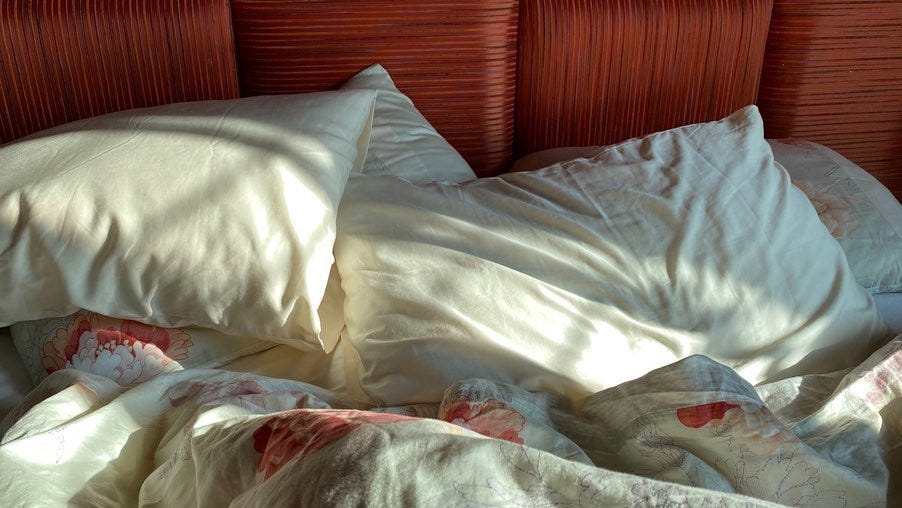From self-quarantine in Kuala Lumpur
On evolving towards a new normal, social distancing in Berlin and KL, and love and storytelling in a pandemic.
Home, and locked down
It’s been more than two weeks since I ended my fourteen days of self-quarantine in my family’s home in Kuala Lumpur, having flown back from Germany in March.
I spent most of it in my pajamas—sometimes actual pajamas, sometimes house clothes—and let all my volcanic chin pimples hang out, though on Instagram I saw people dressing up at home and wearing makeup to psyche themselves into a better state of mind. It’s a fair strategy to delineate time when day bleeds into night and night bleeds into day, but it wasn’t my way.
I moved from bed, to desk, to couch, to floor, to bed again—and did not feel too guilty about it, as I could tell myself I was simply being subjected to this. Being initially jetlagged and cooped up in one’s room so long after rarely spending time in one’s room for months can be discombobulating, but I didn’t suffer too much from the sedentary isolation. My friends remarked that I was probably finding quarantine easier than most, and that’s true: I am equal parts wanderer and homebody. When I’m out, I’m out walking, observing, taking photographs, talking to strangers. When I’m in, I’m in reading, writing, pondering, brushing up on a language, watching movies. Either way, I’m happy. In fact, both states of being feel absolutely necessary to me. And what is there to complain about? To even be able to coop up in one’s own room, to quarantine in one’s own home, is a privilege.
And initially, the idea of being able to bookend a period of time—the two weeks of quarantine with a clear beginning and end—felt incredibly attractive to me. I thought it would be a good time to commit to just one project, to work at it every day and complete it by Day 14. That was not how it happened. I wasn’t able to focus on just one thing. There were so many things I wanted to get to that I could hardly complete one before moving on to another, trying to balance them all in incremental measures. I still felt the pressure to be pitching. Yet, what better time to work on a personal project? What better time to have this kind of permission? Well, I squandered that chance, and wasn’t all that productive anyway.
I did, however, finally get to the “life admin” tasks I always put off. I filled in retrospective diary entries, sorted out old journals and reporting notebooks, ordered and filed my invoices, expenses and statements, downloaded photos to free up space on my phone, sent friends photos I still owed them, backed up my writing and photo archives, rearranged my bookshelves and updated my catalogue (I keep one on LibraryThing to track of what I have), chipped away at the molehills of messes in my room, and KonMari-ed for things I could repurpose or give away.
I also spent too much time trying to book delivery slots for groceries, failing repeatedly. My father seemed always to be wanting fresh fruits, and I worried about him going out at all. A friend asked if I could stock up for his parents, but I was still under quarantine. I think this physical limitation, and the fact that I was forced to impress the seriousness of social distancing upon my parents through restrained shouty texts on Whatsapp, made me worry more about the virus. No, Uncle can’t come and hang! No, you can’t drive the three hours back to your hometown to visit relatives! I didn’t want to overstate the dangers, but I thought it would be better for them to be paranoid than complacent. Sometimes, I would doubt myself, and quickly delete the link I had just sent them that laid bare the tragedies of Covid-19.
I guess you reach a point where you feel so helpless in the face of all the innocuous scenarios that could get you infected that you just give up—you can only leave your fate to whatever forces of chance govern our universe. Which reminds me of a hilarious passage by Geoff Dyer on the existential psychic toll wrought by the virus:
as a writer, I am uniquely at risk. Although it’s a wretched life in some ways, I’ve always been heartened by the all-redeeming advantage of spending one’s days writing at home: the freedom to pick one’s nose whenever the urge takes hold—which is pretty much all the time. That’s got to stop. But the writer’s finger is vocationally programmed to go up the writer’s nose. Even now, as I press these keys, a dangerous counter-gravity is urging hand toward face, nose, nostril. Keep typing, keep pounding the keys (which I’m touching now, seconds after sending a text to my tennis partner, on the very same phone that I checked while out having breakfast, before washing my hands when I got back).



